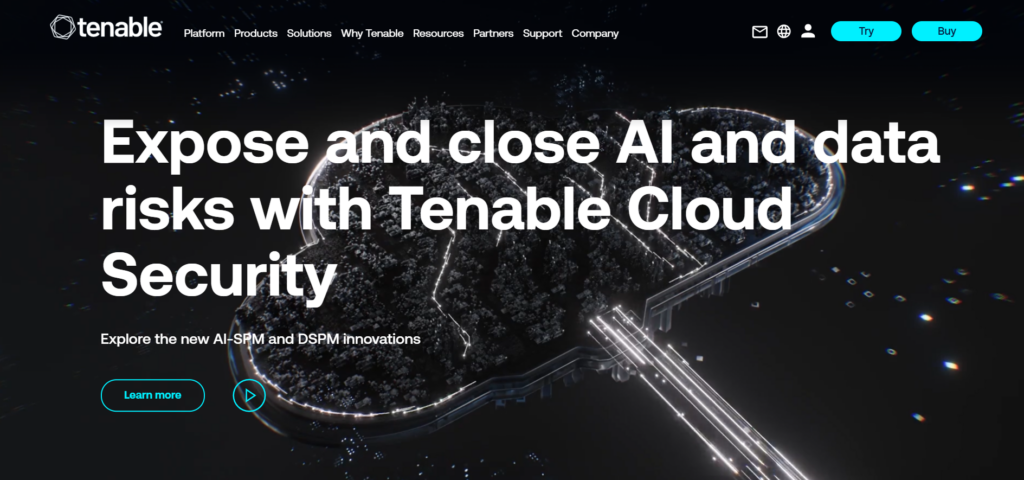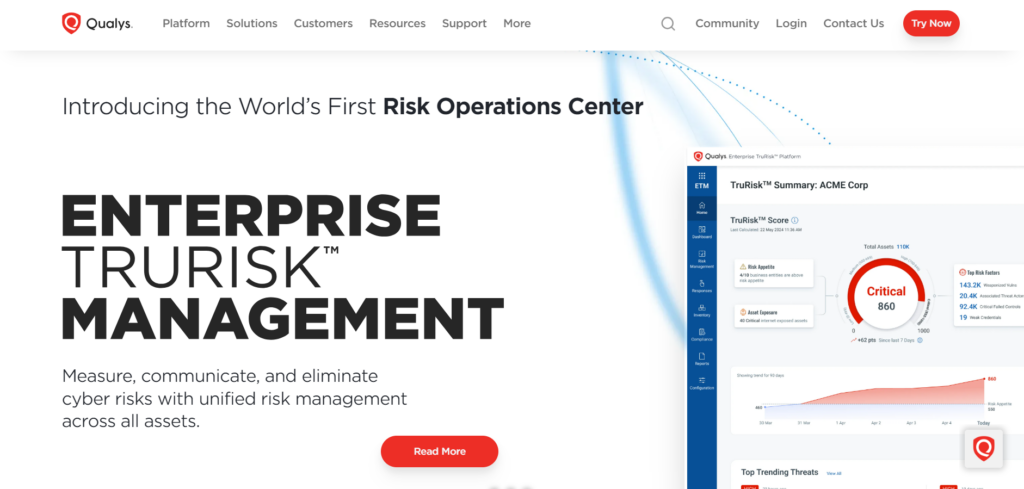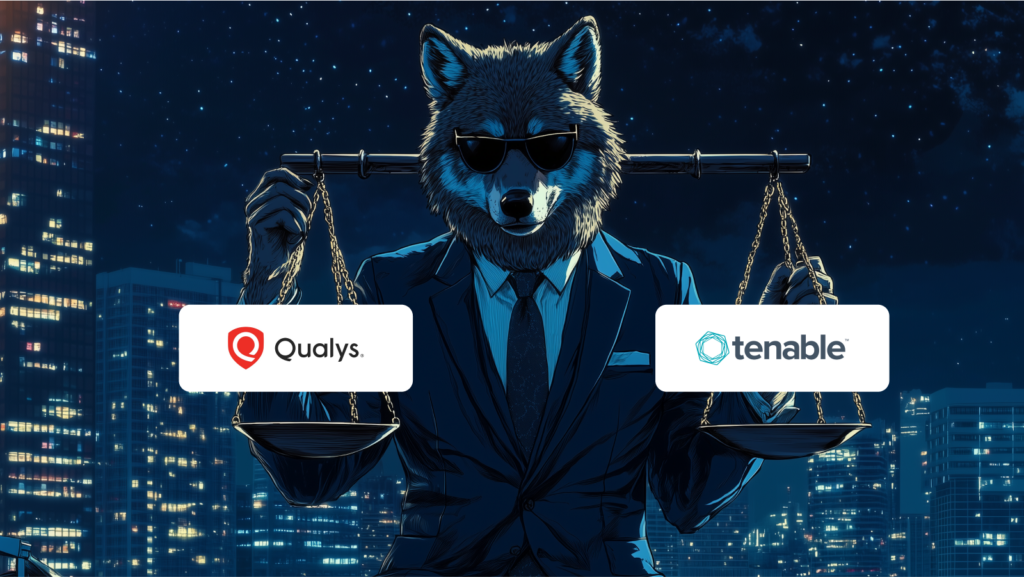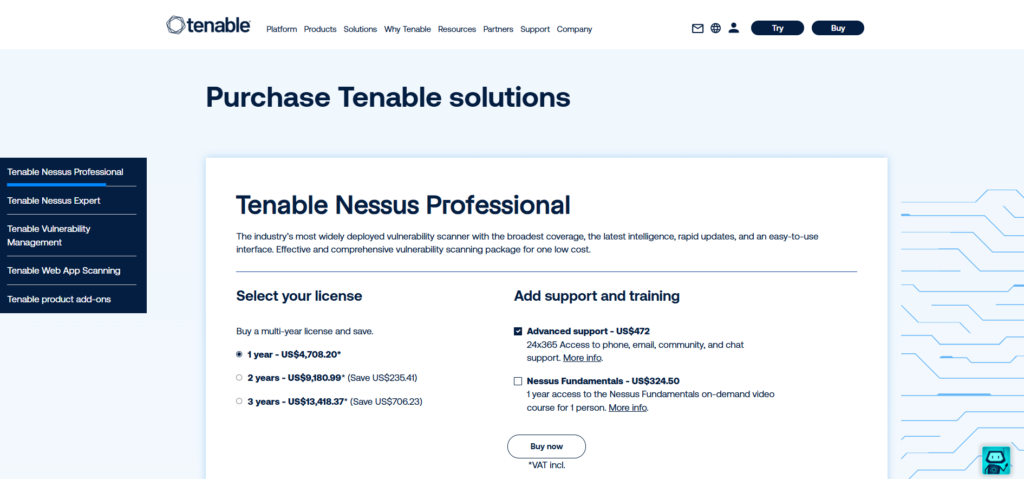Tenable and Qualys are leaders in vulnerability management, but they serve slightly different purposes. Tenable is all about detailed scanning and analytics, helping you spot and fix weaknesses fast. Its tools like Nessus are trusted by cybersecurity pros worldwide.
Qualys offers a broader suite of cloud-based tools, making it easier to manage compliance, secure assets, and scale your security efforts.
Think of Tenable as the specialist and Qualys as the generalist—both are excellent, depending on what you need.
Tenable

Tenable, Inc. is a leading cybersecurity company specializing in vulnerability management and cyber exposure solutions.
Its flagship products include Tenable One, an AI-powered platform for unified exposure management, and Tenable Nessus, a top-rated vulnerability scanner.
Tenable offers solutions tailored to IT, cloud, operational technology (OT), and hybrid environments, helping organizations identify, assess, and remediate vulnerabilities.
With tools like Tenable Vulnerability Management, Tenable OT Security, and Tenable Cloud Security, it provides visibility and actionable insights to reduce risk and enhance security posture.
Tenable empowers businesses to proactively protect their digital assets and maintain compliance in an evolving threat landscape.
[button-red url=”https://digitalmarketerr.com/recommends/tenable/” target=”_blank” position=”center”]🔥Try Tenable Now[/button-red]
Qualys

Qualys, Inc. is a leading provider of cloud-based security and compliance solutions. Founded in 1999 and headquartered in Foster City, California, it serves over 10,000 customers globally, including a significant portion of Forbes Global 50 companies.
The Qualys Enterprise TruRisk™ Platform provides a unified view of cyber risk, enabling organizations to efficiently assess and mitigate vulnerabilities across their attack surfaces.
Its suite of integrated applications automates auditing, compliance, and security tasks, delivering real-time intelligence.
Partnering with major cloud providers like AWS, Azure, and Google Cloud, Qualys continues to innovate, recently expanding into SaaS and multi-cloud environments for enhanced security.
[button-red url=”https://www.qualys.com/” target=”_blank” position=”center”]🔥Try Qualys Now[/button-red]
Features Comparison: Tenable vs Qualys
Tenable and Qualys are prominent providers in the vulnerability management sector, each offering distinct features and capabilities. Here’s a comparative overview:

1. Asset Coverage:
- Tenable: Offers comprehensive coverage across various asset types, including endpoints, network devices, operational technology (OT), identity systems, cloud workloads, and web applications.
- Qualys: Provides extensive asset coverage but lacks support for OT devices and certain identity systems like Active Directory (AD) and Entra ID.
2. Cloud Security Identity Protection:
- Tenable: Features a fully operational, industry-leading Cloud Infrastructure Entitlement Management (CIEM) solution that is currently protecting customers.
- Qualys: Is in the early stages of introducing similar capabilities.
3. Exposure Management Analytics:
- Tenable: Provides the Tenable One platform, an exposure management solution that integrates risk metrics across vulnerability management, web application security, cloud, identity, OT, and Attack Surface Management (ASM).
- Qualys: Does not offer a comparable integrated exposure management platform.
4. Vulnerability Intelligence:
- Tenable: Delivers rich contextual information on vulnerabilities, including exploitation likelihood and potential impact.
- Qualys: Lacks a robust vulnerability database with enriched metadata and advanced search/filtering capabilities.
5. Patch Management and Remediation:
- Tenable: Integrates with leading third-party remediation tools and supports remediation workflows.
- Qualys: Offers partial patch management integrated with its Vulnerability Management, Detection, and Response (VMDR) solution but does not support popular remediation tools like BigFix.
6. Professional Services and Support:
- Tenable: Provides advanced levels of support, including Premier and Elite tiers, as well as professional services.
- Qualys: Does not offer professional services and has limited support from an overstretched Technical Account Manager (TAM).
7. Industry Recognition:
- Tenable: Ranked #1 in worldwide device vulnerability management market share for six consecutive years by IDC.
- Qualys: Also recognized in the industry but does not hold the same market share position.
In summary, while both Tenable and Qualys offer robust vulnerability management solutions, Tenable distinguishes itself with broader asset coverage, advanced exposure management analytics, comprehensive vulnerability intelligence, and strong professional support services. These factors contribute to its leading position in the vulnerability management market.
Pricing Comparison: Tenable vs Qualys
When comparing the pricing structures of Tenable and Qualys, it’s essential to consider the specific needs and scale of your organization, as both offer distinct models catering to different requirements.
Qualys Pricing:
1. Subscription Model:
Qualys operates on an annual subscription basis, with costs varying based on the number of endpoints monitored. Historically, pricing has ranged from approximately $295 for small businesses to $1,995 for larger enterprises.
2. Additional Costs:
Certain features, such as patch management and endpoint detection and response (EDR) policy compliance, may incur extra fees, potentially increasing the total cost for organizations seeking comprehensive solutions.
[button-red url=”https://www.qualys.com/” target=”_blank” position=”center”]🔥Try Qualys Now[/button-red]
Tenable Pricing:

1. Initial Investment:
Tenable’s SecurityCenter, now known as Tenable.sc, has been noted to start at around $20,000, with additional annual maintenance fees.
2. Comprehensive Features Included:
Tenable Nessus offers a multi-year pricing plan starting at $4,708.20 per year, with discounts for longer commitments. Support services are available for an additional $472, and on-demand training can be added for $295.
[button-red url=”https://digitalmarketerr.com/recommends/tenable/” target=”_blank” position=”center”]🔥Try Tenable Now[/button-red]
Why Tenable Might Be a Better Investment:
1. Integrated Features:
Tenable provides comprehensive features within its base pricing, potentially reducing the need for additional expenditures on separate modules or services.
2. Scalability:
Tenable’s solutions are designed to scale effectively with organizational growth, accommodating increasing assets and complex infrastructures without significant incremental costs.
3. Market Leadership:
Tenable has been recognized as a leading force in vulnerability management, ranking among the top vendors in both growth and innovation indexes.
In summary, while Qualys may offer a lower entry price point, especially appealing to smaller organizations, Tenable’s pricing structure includes a broader range of integrated features and scalability, which can lead to a more cost-effective solution in the long term for organizations seeking comprehensive vulnerability management.
The Final Verdict
Tenable and Qualys are both strong vulnerability management platforms, but Tenable offers key advantages. It provides broader coverage for a variety of assets, including operational technology (OT) and identity systems like Active Directory, which Qualys lacks.
Tenable also excels with its advanced exposure management through Tenable One, enriched vulnerability intelligence, and better cloud security capabilities. Its seamless integration with remediation tools enhances the patch management process.
For organizations seeking a more comprehensive, proactive, and versatile security solution, Tenable is the superior choice.
[button-red url=”https://digitalmarketerr.com/recommends/tenable/” target=”_blank” position=”center”]🔥Try Tenable Now[/button-red]
FAQ’s
Which platform offers broader asset coverage?
Tenable provides broader asset coverage, including OT and identity systems.
How do they handle vulnerability prioritization?
Tenable uses advanced metrics like exploit likelihood, while Qualys relies on basic risk scores.
Which platform offers integrated exposure management?
Tenable has the Tenable One platform; Qualys lacks a comparable solution.
What about cloud security?
Tenable leads with a mature CIEM solution; Qualys is in the early stages.
Are remediation tools supported?
Tenable integrates with leading tools; Qualys offers limited patch management.
How do their pricing models differ?
Qualys has lower initial costs; Tenable offers more inclusive and scalable pricing.
